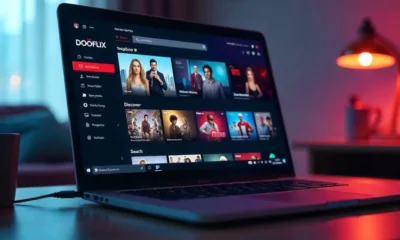BUSINESS
Bloomberg Billionaires Index: Unveiling the Wealthiest Lives

The Bloomberg Billionaires Index captures global attention, reflecting the fortunes, power, and influence of the world’s wealthiest individuals. As financial landscapes shift, this constantly updated ranking unveils dramatic successes, strategic investments, and daring retreats. It’s not just about numbers—it’s about human ambition, fear, and triumph.
Why the Bloomberg Billionaires Index Matters
Understanding the Bloomberg Billionaires Index is essential for investors, economists, and the curious public, because it:
-
Serves as a real-time barometer of wealth accumulation and loss.
-
Highlights trends in global markets, emerging industries, and economic policies.
-
Influences public perception, investor behavior, and policy-making.
By scanning the index regularly, stakeholders gain early insight into power shifts that can ripple through markets and society.
How It Works: Methodology Explained
The Bloomberg Billionaires Index calculates net worth by evaluating publicly available data:
-
Market Valuation
For public companies, wealth is derived by multiplying the individual’s shareholdings by the current stock price. -
Private Asset Estimation
Bloomberg uses industry benchmarks, comparable company valuations, and expert input to estimate private business worth. -
Debt and Liabilities
Liabilities—loans, mortgages—are subtracted to determine net worth. -
Daily Updates
Adjustments reflect market fluctuations, mergers, acquisitions, or investment updates.
This dynamic approach ensures that the index remains current, offering a transparent lens into economic power. It also humanizes wealth—as fortunes can evaporate overnight, sparking fear or inspiration.
What Drives Wealth Movements?
Wealth movements on the Bloomberg Billionaires Index stem from several powerful forces:
Market Volatility and Stock Performance
Public-market oscillations profoundly impact net worth. A single earnings report can amplify or erode billions.
New Business Ventures
Entering high-growth sectors like AI, biotech, renewable energy, or fintech can trigger meteoric rises.
M&A Activity
Strategic mergers or acquisitions often unlock windfalls for billionaire founders and investors.
Economic and Regulatory Shifts
Taxes, tariffs, and policy shifts may storm through wealth landscapes, prompting restructuring dives or soaring valuations.
Real-Life Examples: Rags to Riches and Sudden Losses
-
A tech CEO’s company IPO vaulted them into the Bloomberg Billionaires Index overnight, sparking both public fascination and economic trepidation.
-
A renowned founder known for conservative investing saw his ranking slide after a market downturn wiped out a large stake—highlighting how precarious wealth can be.
These personal stories show that behind each headline lies human psychology—hope, excitement, regret, and occasionally fear.
Table: Comparing Wealth Measurement Features
To appreciate how the Bloomberg Billionaires Index accurately ranks individuals, here’s a detailed comparison of five key features:
| Feature | Cost | Efficiency | Ease of Use | Scalability | Benefits |
|---|---|---|---|---|---|
| Market Valuation | Low | High | Very Easy | Global Access | Real-time reflection of public equity wealth. |
| Private Asset Valuation | Moderate | Moderate | Complex | Scales With Data | Captures wealth unavailable via public markets. |
| Debt Adjustment | Low | High | Easy | Global Coverage | Offers realistic net worth estimates. |
| Daily Updates | Moderate | High | Automated | Fully Scalable | Tracks rapid wealth changes. |
| Expert Analysis | Higher | Moderate to High | Variable | Limited by Access | Brings depth and context to valuations. |
This breakdown reveals how Bloomberg merges automation with expert insight to craft a trustworthy, scalable index.
Emotions Driving Engagement
The emotional undercurrent in wealth reporting cannot be ignored. On one hand:
-
Fear: Viewers worried about market instability anxiously track billionaire losses, fearing wealth erosion.
-
Aspiration: Entrepreneurs chasing success see hope in billion-dollar milestones.
-
Curiosity: The public’s fascination with luxury, influence, and strategy draws millions to the Bloomberg Billionaires Index.
By blending data with narrative, the index sparks both visceral and intellectual responses, anchoring it in popular culture and investment circles.
The Human Side: Stories Behind the Numbers
Key billionaire profiles illustrate how personal journeys intersect with global economies:
-
Late bloomers who founded scalable startups and saw wealth multiply dramatically within years.
-
Inherited dynasties balancing legacy obligations and modern market demands, often dividing public sentiment.
-
Philanthropic pivoters, whose rankings drop as they funnel wealth into causes—prompting debate about the meaning of “success.”
These narratives provide emotional texture to cold data, illuminating sacrifice, strategy, and moral dilemmas.
Why Accuracy and Trust Matter
The Bloomberg Billionaires Index adheres to rigorous journalistic and financial standards:
-
Transparency: Explains valuation models and data sources.
-
Independence: Remains free from advertiser or corporate influence.
-
Cross-Verification: Employs expert review to confirm or question asset evaluations.
-
Ethical Reporting: Aims for fairness and balance, avoiding sensationalism.
This commitment to credibility preserves reader trust and minimizes the risk of data manipulation or overstatement.
Using the Index: Actionable Tips
1. Spotlight Emerging Trends
Monitor new entrants rising abruptly into the index—signals of growth sectors or technological breakthroughs.
2. Risk Management
Watch losses in high-wealth individuals as early warnings of market instability that may ripple into broader portfolios.
3. Idea Generation
Entrepreneurs can glean insight from billionaires’ sectors of focus. For instance, spikes in biotech valuations might forecast inbound investors.
4. Policy Forecasting
Government regulators and NGOs may use billionaire rankings to spotlight wealth inequality, shifting tax conversations or public agenda.
Integrating the Index into Strategy
For Investors
Incorporate the Bloomberg Billionaires Index into your dashboard as an overlay to broader market trends. It reveals where big money flows and flags possible pivot points.
For Business Leaders
Assess competitor wealth and capitalization by tracking founder movements. Sudden rises may indicate aggressive expansions or pending IPOs.
For Policy Analysts
Evaluate wealth distribution trends over time. Surges in billionaire wealth may provoke public scrutiny, shaping tax policy or campaign platforms.
Future Outlook: What Lies Ahead
-
AI and Fintech Frontier
Expect billionaires from artificial intelligence or digital finance to surge upward, redefining the index landscape. -
Geographic Diversification
As wealth generation spreads beyond Western tech hubs, expect representation from Asia, Africa, and Latin America. -
ESG Integration
Corporate commitment to environmental, social, and governance initiatives may increasingly impact asset values as institutional investors pivot.
Thus, continual monitoring of the Bloomberg Billionaires Index provides a strategic vantage point.
Challenges and Criticisms
1. Private Wealth Opacity
Estimating private assets remains imperfect; revisions are common, and some majors may be overstated or underreported.
2. Psychological Bias
Fear of losing net worth may trigger irrational decision-making among investors who prematurely exit markets.
3. Overemphasis on Riches
Public fascination risks reinforcing social inequality and moral hazards around wealth glorification.
The Bloomberg Billionaires Index addresses these by emphasizing context, not celebration.
Enhancing Financial Literacy
Educators and content creators leverage the index to inspire learning:
-
Breaking down how stock holdings multiply net worth.
-
Showing the interplay of debt and leverage.
-
Demonstrating how market forces can rapidly change fortunes.
These illustrative case studies help audiences grasp broader economic truths.
Conclusion
The Bloomberg Billionaires Index offers powerful insight into global wealth dynamics. By balancing rigorous data models, expert analysis, and human stories, it remains an essential tool for anyone seeking to understand economic influence, market trends, and power shifts. Whether you’re an investor tracking industry leaders, a policymaker addressing wealth concentration, or simply someone curious about financial giants, this index delivers valuable intelligence.
FAQS
What is the Bloomberg Billionaires Index?
The Bloomberg Billionaires Index is a live ranking of the world’s wealthiest individuals, calculated daily using public market data, private asset estimates, and debt analysis to provide timely net worth valuations.
How often is the index updated?
It updates every market day, reflecting real-time stock prices, new transactions, and valuation changes to keep its listings current.
Can private company holdings influence the index?
Yes. Bloomberg estimates private assets using industry benchmarks and expert insight, which plays an important role in private holdings that have not gone public.
Why do billionaire rankings fluctuate so much?
Net worth volatility stems from stock price changes, large acquisitions, debt adjustments, and shifts in private valuations that drive daily ranking changes.
Is the index reliable for investment decisions?
It’s a useful informational tool but should not be the sole basis for decisions. Combining it with personal financial planning and professional advice is key.
Can the index affect public perception and policy?
Absolutely. Rising billionaire wealth often sparks debate around inequality, taxation, and regulation, shaping societal narratives and influencing lawmakers.
BUSINESS
Why Dot Business Cards Are a Game-Changer in 2025

Dot business card is a smart business card embedded with NFC (Near Field Communication) technology or a QR code. With a quick tap or scan, it instantly shares your contact information, portfolio, social media profiles, or even a custom landing page.
Here’s how it works:
- Tap the card on a smartphone, or scan the QR code
- Your contact card opens in the phone’s browser
- The recipient can save your info instantly—no app required
It’s fast, paperless, and makes a lasting impression.
“Digital business cards like Dot are the future of networking. They save time, reduce waste, and create real value in a virtual-first world.” — Forbes
Why Entrepreneurs and Professionals Are Switching to Dot
1. Efficiency That Speaks Volumes
Forget fumbling around for cards at a networking event. With Dot:
- You tap, they save
- No printing costs
- Always up-to-date
2. Perfect for Freelancers & Consultants
When your portfolio is your pitch, Dot makes it effortless to:
- Share work samples on the spot
- Direct clients to your booking page
- Add credibility with a branded digital presence
3. Sales Teams Love It
Sales reps, SDRs, and BDRs benefit from:
- Seamless lead capture
- Integration with CRMs
- Immediate follow-up options
According to HubSpot, teams using digital tools for contact sharing saw a 38% improvement in lead engagement.
4. Branding for Marketing Pros & Event Staff
Stand out with custom logos, colors, and calls-to-action. Dot turns your card into a mini-marketing machine.
5. Perfect for Tech-Savvy and Eco-Friendly Users
If you care about reducing waste and staying ahead of the curve:
- One Dot card replaces thousands of paper cards
- You can update info anytime without reprinting
TechCrunch calls the Dot NFC card “A game-changer in sustainable, smart networking.”
NFC Business Card vs QR Code Business Card: Which Is Better?
| Feature | NFC Card | QR Code Card |
|---|---|---|
| Tap to share | ✓ | ✗ |
| Scan with camera | ✗ | ✓ |
| App required | No | No |
| Works on all phones | Most | All |
| Speed | Instant | Slight delay |
| Professional appeal | High | Moderate |
In short: NFC offers a sleeker, more modern user experience. But QR code functionality ensures universal access.
Dot vs Popl vs Linq — Which Digital Business Card Is Better?
All three are solid options, but Dot stands out in:
- Simplicity: No subscriptions needed
- Design: Sleek, minimal, brand-friendly
- Customization: Personalized URL, custom profiles, and analytics
For professionals who want a balance of style, speed, and substance, Dot leads the pack.
How to Create a Digital Business Card with Dot NFC
- Order a Dot card from the official site
- Create your profile: Add links, bios, photos, booking tools, etc.
- Activate your card: Tap it to your phone and link it to your profile
- Start sharing: Anytime, anywhere, no app needed
Benefits of Using a Contactless Business Card at Networking Events
- Reduces friction during busy conversations
- Makes you memorable with high-tech flair
- Easy follow-ups via saved contact details
- Boosts your professional image instantly
Real-World Scenarios Where Dot Shines
- At trade shows when you’re meeting dozens of people in minutes
- During a client pitch when you want to share your portfolio instantly
- After speaking on stage to share your info with the crowd
- At casual meetups where pulling out a card feels too formal
Final Thoughts:
In today’s fast-moving world, making connections that count is everything. Whether you’re a founder, freelancer, or field rep, a Dot business card helps you show up smarter, faster, and more impressively.
It’s not just a card. It’s your digital handshake.
FAQ’s:
Are Dot business cards worth it for small business owners?
Absolutely. You make a one-time investment, and it eliminates printing costs, adds branding power, and supports real-time updates.
How do I update my Dot business card contact info?
Simply log into your Dot dashboard, update your profile, and changes reflect immediately. No new card needed.
How to share your LinkedIn with a Dot card?
Just add your LinkedIn link to your Dot profile. When someone taps your card, they can go straight to your LinkedIn page.
People Also Ask (PAA) Section
What is a digital identity card?
A digital identity card holds your personal or professional information in a secure, shareable format—like Dot. It makes connecting faster and easier.
Can Dot business cards be used by teams?
Yes, Dot offers multi-user plans for teams and corporate accounts. Ideal for consistent branding across sales or marketing departments.
Is the Dot business card app-free?
Yes! You and your recipients don’t need to download an app. Everything works through mobile browsers.
Are digital business cards eco-friendly?
Yes. By reducing or eliminating paper waste, Dot cards are a great eco-friendly business card option for sustainable-minded professionals.
Author Bio:
Written by Awais Nazir, a digital content specialist with 5+ years of experience writing SEO-optimized articles for tech and business blogs. Awais holds a degree in Media & Communications and specializes in emerging tech tools for professionals.
Free Download: Networking Toolkit for 2025
Want to make the most of your smart business card? Grab our free checklist: “10 Ways to Network Smarter with Digital Tools”. Perfect for events, client meetings, and cold outreach.
BUSINESS
How to Use Business Car Finance to Grow Your Brand

If you’re running a small or medium-sized business, managing a startup, overseeing a fleet, or handling finances for a professional service, every expense counts — and vehicle acquisition is no exception. Whether you’re looking to expand your operations, replace aging fleet vehicles, or simply free up working capital, business car finance offers strategic flexibility without the upfront financial burden.
With rising vehicle costs and tighter budgets in 2025, business owners are seeking smarter ways to access transport solutions. In this guide, we break down how business vehicle finance works, its benefits, pitfalls, and how to make the best choice for your company—backed by expert insights and practical tools.
What Is Business Car Finance and How Does It Work?
Business car finance is a financing option that enables businesses to purchase or lease vehicles for commercial use. Unlike personal car loans, these are structured with business operations in mind and can include tax benefits, flexible terms, and fleet options.
Common Types of Business Car Finance
| Finance Option | Description |
|---|---|
| Business Auto Loans | Standard loan where the company owns the car outright after repayment. |
| Company Car Leasing | Fixed-term lease with the option to buy, return, or upgrade. |
| Fleet Vehicle Financing | Designed for multiple vehicle purchases, often with volume discounts. |
| Hire Purchase (HP) | Ownership transfers after all payments and fees are cleared. |
| Operating Lease | Similar to a rental; no ownership at end, often used to keep vehicles off the balance sheet. |
Who Should Consider Business Car Finance?
This financing method is ideal for:
- Small to Medium Business Owners (SMBs) looking to improve cash flow.
- Fleet Managers needing cost-effective vehicle rotation strategies.
- Startups seeking vehicles without large capital outlays.
- Self-employed professionals who use cars for business activities.
- Financial Decision Makers optimizing tax and operational costs.
Pros and Cons of Financing a Car Through Your Business
Benefits
- Preserve capital for other investments.
- Tax-deductible car finance: Lease payments and interest may be deductible (consult your accountant).
- Access to newer models for improved reliability and image.
- Flexible lease terms for scaling operations.
Drawbacks
- Mileage restrictions on some leases.
- Early termination fees if you change your plan.
- Potential depreciation costs if you buy instead of lease.
Source: U.S. Small Business Administration, NerdWallet Business Auto Loans
Business Car Finance vs Personal Car Finance
| Feature | Business Car Finance | Personal Car Finance |
|---|---|---|
| Ownership | Company or leasing firm | Individual |
| Tax Deductions | Available | Limited |
| Credit Impact | Business credit score | Personal credit score |
| Usage | Business-related | Personal use |
Tip: Using a vehicle 100% for business makes it easier to claim tax-deductible expenses. Hybrid use complicates deductions and may raise audit risks.
Expert Tips on Choosing the Right Business Vehicle Finance
1. Evaluate Total Cost of Ownership (TCO)
Include maintenance, insurance, fuel, and depreciation—not just monthly payments.
2. Use a Business Car Loan Calculator
Estimate payments and compare different loan types. Tools like Bankrate’s Auto Loan Calculator are excellent for scenario planning.
3. Consult Your Accountant
Get accountant-approved business car loan strategies that align with your tax situation and cash flow needs.
4. Compare Lenders
Look at both traditional banks and online lenders for the best business auto loan interest rates.
Best Business Car Finance Companies in 2025
| Provider | Best For | Notes |
|---|---|---|
| Ally Bank | Flexible terms | Great for fleet financing |
| Capital One | New businesses | Streamlined online process |
| Wells Fargo | Large loan amounts | Competitive rates |
Local Options: Business Vehicle Finance in [Your City/Country]
Search for “top-rated car finance for businesses in [Your Location]” to find region-specific lenders and lease providers. Local banks may offer better terms for registered businesses in your area.
Apply for Commercial Car Finance Online
Today, many platforms allow you to apply for business vehicle loans online with minimal documentation. Look for options offering:
- Same-day pre-approval
- Business credit evaluation
- Custom quotes for vehicle financing for self-employed professionals
Real-World Case Study
“As a marketing agency owner in Austin, I needed two branded vehicles but didn’t want to tie up our capital. We used a fleet vehicle financing solution through Ally Bank and saw immediate ROI through brand visibility and delivery speed.”
— Sara M., SMB owner, Austin, TX
Final Thoughts
Choosing the right business car finance solution can help you maintain liquidity, scale efficiently, and stay compliant with tax regulations. Whether you’re a startup founder, fleet manager, or self-employed consultant, there’s a smart path forward—if you do the homework, compare wisely, and consult with experts.
FAQ’s:
1. What is business car finance and how does it work?
It allows businesses to lease or purchase vehicles using business credit or capital, offering tax and cash flow advantages.
2. Is business car leasing tax-deductible?
Yes. Lease payments and operating costs are generally deductible if the vehicle is used solely for business. Check with a tax advisor.
3. What’s better: business car finance vs personal car finance?
Business finance protects personal credit and provides tax benefits, but only if the vehicle is strictly for work use.
4. How can I find the cheapest business car lease deals in the UK or US?
Compare quotes online and look for seasonal promotions or manufacturer-backed leasing programs.
5. Where can I find a business car loan calculator for small businesses?
Try NerdWallet, Bankrate, or your local bank’s website for free tools.
Need help finding the best fit? Speak to your financial advisor or accountant, and always read the fine print.
BUSINESS
Allodial System Real Estate: A Complete Guide for Sovereignty-Seeking Property Owners (2025)

In a world where property taxes, government liens, and legal red tape dominate traditional homeownership, the allodial system offers a radically different framework. Rooted in ancient landholding traditions, allodial title refers to owning real estate free and clear of any superior landlord—including the government.
Unlike fee simple ownership (the most common form of property ownership in the U.S.), allodial title provides absolute ownership—with no property taxes, mortgages, or governmental claims.
Who Is Interested in Allodial Real Estate?
The allodial system is especially appealing to:
- Off-grid enthusiasts and homesteaders
- Liberty-minded investors seeking property sovereignty
- Moderate to high-tech savvy adults, aged 28–65
- Residents of Nevada, Texas, Arizona, and New Mexico
- Canadians and Australians exploring alternative property law systems
This demographic actively engages in real estate platforms, legal forums like AVVO, YouTube channels such as LegalEagle or Sovereign Living, and DIY legal solutions to navigate complex land rights.
Understanding Allodial Title vs. Fee Simple
What Is Fee Simple Ownership?
Most homeowners in the U.S. own their property under fee simple, which provides a high degree of ownership—but with conditions. You still owe:
- Property taxes
- Compliance with zoning laws
- Potential eminent domain seizures
Allodial Title Explained
With allodial title, none of these apply. The property is owned entirely and independently of external authority.
Key characteristics include:
- No ongoing tax obligation
- Immune from foreclosure due to unpaid taxes
- Not subject to eminent domain
However, true allodial title is extremely rare in modern legal systems.
Can You Actually Own Allodial Title in the U.S.?
This is where things get nuanced. While allodial title exists in theory, its application in the U.S. is highly limited.
State-Level Exceptions
- Nevada: Once allowed conversion of homes into allodial title by paying a large fee; this program ended in the early 2000s.
- Texas & New Mexico: Some historical precedents and off-grid communities cite allodial principles, but legal systems default to fee simple.
- Arizona: While off-grid living is popular, true allodial title is not recognized under state law.
What Experts Say
According to real estate law expert David Reiss, J.D., Professor at Brooklyn Law School:
“Allodial title in its purest form no longer exists under U.S. law. Most claims of it are symbolic or aspirational rather than enforceable.”
(Source: National Law Review, 2024)
Similarly, Attorney Clint Coons of Anderson Business Advisors warns:
“Be cautious of anyone selling allodial title services. It’s often misrepresented or even fraudulent.”
(Source: Anderson Advisors YouTube, 2024)
Is Allodial Ownership Possible in Canada or Australia?
In both countries, Crown Land ownership dominates the legal landscape. That means the state technically retains ultimate ownership, though individuals may enjoy long-term leaseholds or fee simple rights.
- In Canada, land is held under the Crown, making allodial title legally impossible.
- In Australia, land tenure systems also recognize government supremacy, although Indigenous communities have fought for more autonomous land rights.
“Australia’s system is based on Torrens Title, which does not recognize allodial title.”
— Dr. Nicole Graham, University of Sydney, Property Law Faculty
(Source: Journal of Environmental Law and Policy, 2023)
Why the Allodial System Still Matters
Even if true allodial title is rare, the philosophy behind it is powerful. It aligns with:
- Minimal taxation
- Off-grid autonomy
- Government skepticism
- Private land trust structures
- Decentralized ownership models
Some property owners use land trusts, private contracts, and asset protection strategies to emulate the benefits of allodial title.
Practical Tips: How to Maximize Property Sovereignty Legally
If you can’t own your land allodially, here’s how to get as close as possible:
1. Use a Land Trust
Place your property in a revocable land trust to:
- Keep ownership private
- Shield property from public record
- Potentially reduce estate taxes
2. Pay Off All Debts and Taxes
A debt-free, tax-paid property gives you maximum control—if not true sovereignty, then at least freedom from liens.
3. Live in Unincorporated Areas
In counties without strict zoning or code enforcement, you can:
- Avoid building permits
- Install off-grid utilities
- Reduce interactions with bureaucracies
4. Understand Legal Limits
Don’t fall for scams. Validate every claim with:
- Your county recorder
- Licensed real estate attorneys
- State land management offices
Final Thoughts: Allodial Isn’t Dead—But It’s Rare
While allodial system real estate has deep historical roots and continues to inspire liberty-minded landowners, most practical applications today are symbolic or limited. Still, understanding the concept can empower property buyers to make smarter, sovereignty-focused decisions.
Invest in education, legal structure, and strategic land purchases to build your version of modern land independence.
FAQ’s:
Q1: Can I still obtain allodial title in Nevada?
No. The program was discontinued in the early 2000s. No new applications are being accepted.
Q2: Is allodial title the same as fee simple?
No. Allodial title is superior, with no obligations to a sovereign power. Fee simple is subject to taxation and regulations.
Q3: Are there any modern equivalents of allodial ownership?
Yes—land trusts, homestead exemptions, and off-grid zoning offer partial benefits.
Q4: What should I be cautious of?
Avoid services promising to “convert your property to allodial title” without state-recognized legal support. These are often scams.
Q5: Where can I learn more?
Check out:
- National Law Review – Property Law Section
- Anderson Advisors YouTube Channel
- NOLO Legal Encyclopedia on Property Ownership
-

 TECH5 months ago
TECH5 months agoOnionPlay Safe to Use in 2025? | Safer Alternatives, Privacy Tips & VPN Picks
-

 TECH5 months ago
TECH5 months agoDooflix App for PC: Best Ways to Use It on Windows 10/11
-

 TECH5 months ago
TECH5 months agoIs Scrolller Safe? A 2025 Guide to NSFW Browsing with Confidence
-

 BLOG6 months ago
BLOG6 months agoMedihoney: The Natural Healing Power Revolutionizing Wound Care
-

 TECH5 months ago
TECH5 months agoIs F95 Safe? A Complete 2025 Guide for Privacy-Conscious NSFW Gamers
-

 BUSINESS6 months ago
BUSINESS6 months agoHuns Yellow Pages: The Ultimate Business Directory for Local Searches
-

 EDUCATION5 months ago
EDUCATION5 months agoAnna’s Archive: The People’s Open Library in a Digital Age
-

 HEALTH6 months ago
HEALTH6 months agoDoctiplus: Revolutionizing Healthcare with Smart Digital Solutions
